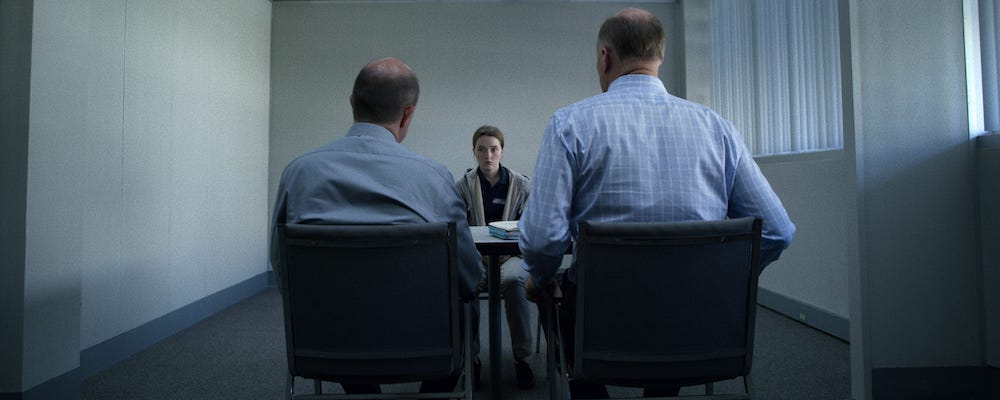Netflix’s ‘Unbelievable’ Is an Unsettling yet Empowering True Crime Story
Andrew Bundy
The introductory stretch of Netflix’s new true crime miniseries “Unbelievable” is incredibly troubling to watch. In the first fifteen minutes, a young woman named Marie Adler (Kaitlyn Dever) is forced to recall the details of her rape no fewer than four times. First, to the responding officer on the scene, then to the lead detective, the nurse taking her blood test results, and so on. It may be extremely difficult for some viewers to stomach. The traumatic experience recounted by the assault victim is captured and reimagined through a slightly different prism each time Marie is forced to revisit the memory; it’s shocking to witness and upsetting to watch, but shot with respectful intent and a vital purpose.
Based on the real-life story surrounding a Pulitzer prize winning investigation, “Unbelievable” is a disarming and courageous miniseries with uber-intense opening. The series is adapted from the journalistic piece, with the structure even mirroring the article, in some regards. The first hour of the Netflix’s series almost promises a different story than what the audience is actually in store for; which eventually unfolds more in the spirit of a “Mindhunter”-esque procedural than a super serious melodrama about a survival victim; there are shades of both, but the buddy cop formula is what primarily drives the plot and pulse of the story.
The first episode, directed by Lisa Cholodenko, is entirely dedicated to Marie and her post-traumatic experience, which takes place in 2008. Visual memories can be incredibly difficult for victims to recall, and after noting a few inconsistencies in her official statements, Detective Parker (Eric Lange) coerces Marie into believing that she made her story up, even threatening her with a polygraph test. Utterly humiliated, her life falls apart, top to bottom. No one will believe a thing Marie says because they believe she lied about being assaulted. The series then jumps ahead to 2011, where we meet Karen Duvall (Merritt Wever) and Grace Rasmussen (Toni Collette), two detectives from neighboring Colorado precincts who start to suspect that they both may be looking for the same serial rapist; a perpetrator who’s ritual sounds a lot like the man who assaulted Marie.
It’s never really an issue following the contrasting storylines, though it is interesting to note that the show is actually cutting back and forth between two different time periods until the threads catch up with each other in the final hour, creating a unique storytelling approach. The overall construct of the season may closely follow details of the original article, but it seems unfit for episodic television. Such is the case of Collette’s character not showing up until the last scene of the second episode, yet she’s the top billed star. Netflix clearly wants you to binge “Unbelievable.” The series effectively takes three full hours to set up all of its moving pieces. What is illuminating about the juxtaposition, however, is how the parallel narratives contrast the investigative process against a personal journey of recovery and acceptance, resulting in a kind of existential, true-crime mystery about the capacity for human care and decency, making one question what people are truly capable of, deep down.
“No matter how much someone says they care about you, they just don’t,” Marie confesses in a therapy scene. She believes what she’s saying. After what she’s gone through how can she open up to anyone? “Unbelievable” understands that the pendulum of humanity swings both ways though, using Wever and Collette’s characters to combat the all-encompassing awfulness of her post-assault living situation. All three leads are tremendous, with Wever’s pathos specifically standing out, having revealed her remarkable acting talents in the outstanding western miniseries “Godless.” The detective characters serve as a necessary hopeful counterpoint to Marie’s emotional isolation.
Primarily co-written by Susannah Grant, alongside award winning novelists Ayelet Waldman and Michael Chabon, the series feels a little journalistic and textbook at times. “Unbelievable” does distinguish itself as an almost docudrama series, but it also can occasionally feel a little like a “Law & Order” episode. The writers attempts to rectify these artistic differences by blending statistics and soap opera to each other’s benefit. Sometimes the formula is successful and sometimes it comes off as superficial; something that’s simply unavoidable when adapting such sensitive subject matter.
While cathartic may seem like an inappropriate word to attribute to a story about sexual assault, “Unbelievable” is ultimately a hopeful series about healing the scars the world has inflicted on far too many. The shape of the show’s structure takes some time to comes into focus, and its tone is a bit cluttered, but such deft handling of the subject matter — material that could be inescapably bleak in the hands of lesser talent — is a skillful testament to a thought provoking crime series on virtue and vindication.
“Unbelievable” begins streaming Sept. 13 on Netflix.

